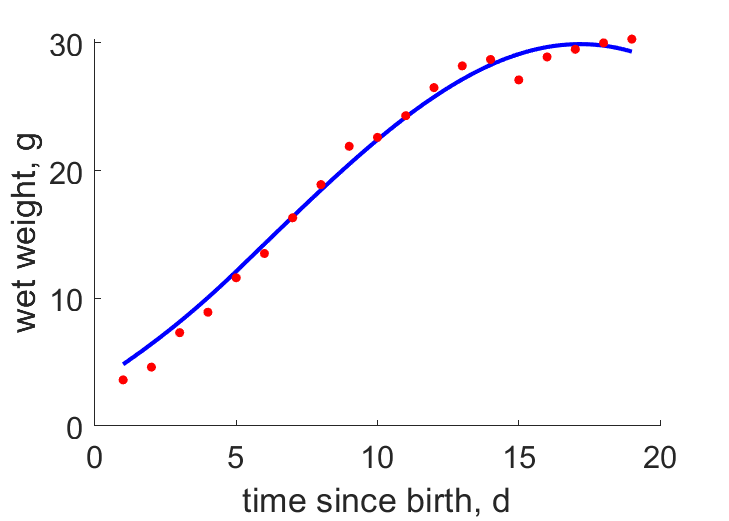Predictions & Data for this entry
| Model: std | climate: BSk, BWk | migrate: | phylum: |
| COMPLETE = 2.5 | ecozone: TPa | food: biCi | class: |
| MRE = 0.040 | habitat: 0iTh, 0iMm | gender: Dg | order: |
| SMSE = 0.006 | embryo: Tnpf | reprod: O | family: |
Zero-variate data
| Data | Observed | Predicted | (RE) | Unit | Description | Reference |
|---|---|---|---|---|---|---|
| ab | 17 | 17.24 | (0.01405) | d | age at birth | avibase |
| tx | 20 | 20.02 | (0.000904) | d | time since birth at fledging | avibase |
| tp | 60 | 59.37 | (0.01055) | d | time since birth at puberty | guess |
| tR | 365 | 365 | ( 0) | d | time since birth at 1st brood | avibase |
| am | 1825 | 1825 | (0.0001902) | d | life span | guess |
| Ww0 | 3.81 | 4.901 | (0.2863) | g | initial weight | avibase |
| Wwb | 3.6 | 3.366 | (0.06489) | g | wet weight at birth | Broe1959 |
| Wwi | 32.2 | 32.83 | (0.01971) | g | ultimate wet weight for female | avibase |
| Wwim | 37.5 | 37.56 | (0.001673) | g | ultimate wet weight for male | avibase |
| Ri | 0.01096 | 0.01091 | (0.004293) | #/d | maximum reprod rate | avibase |
Uni- and bivariate data
| Data | Figure | Independent variable | Dependent variable | (RE) | Reference |
|---|---|---|---|---|---|
| tW |  | time since birth | wet weight | (0.03946) | Broe1959 |
Pseudo-data at Tref = 20°C
| Data | Generalised animal | Promerops cafer | Unit | Description |
|---|---|---|---|---|
| v | 0.02 | 0.03529 | cm/d | energy conductance |
| p_M | 18 | 498.3 | J/d.cm^3 | vol-spec som maint |
| k_J | 0.002 | 0.02045 | 1/d | maturity maint rate coefficient |
| k | 0.3 | 0.3001 | - | maintenance ratio |
| kap | 0.8 | 0.9166 | - | allocation fraction to soma |
| kap_G | 0.8 | 0.8011 | - | growth efficiency |
| kap_R | 0.95 | 0.95 | - | reproduction efficiency |
Discussion
- Body temperature is guessed
- Males are assumed to differ from females by {p_Am} only
- mod_1: Pseudo-data point k is used, rather than k_J; Data set tp and parameter t_R are added, the latter replacing clutch interval t_N. Postnatal T is based on PrinPres1991, see get_T_Aves. See further the revision page, theme puberty
Bibliography